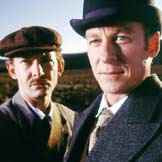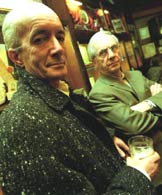 Bert Coules
Bert Coules
Holmes writer and dramatiser for Radio 4 |
Bert Coules is a man who's had more experience of Sherlock Holmes than most. Not only was he head writer on the BBC's project to dramatise the entire Holmes canon for Radio Four, but he then went on to write The Further Adventures of Sherlock Holmes - new stories based on passing references from the stories.
We caught up with him for a chat about new Holmes, who Watson really is and more.
When did you first encounter Sherlock Holmes?
Oh, when I was a schoolboy. I can't remember now whether it was the books, or the old sixties radio programmes with Carleton Hobbs and Norman Shelley. I remember listening to those shows and if I hear them now it brings back to me the whole ambience of being a kid, and I can see my parents' big polished radiogram in the corner. So that's something very exciting and very nostalgic all at the same time.
Which stories were hardest to dramatise?
 In some ways, the best known and best loved stories are the hardest to work with, because you know, in the back of your mind, that an awful lot of people know the stories inside-out and backwards. There are very literary societies devoted to studying Conan Doyle, and there are fan clubs devoted to Sherlock Holmes.
In some ways, the best known and best loved stories are the hardest to work with, because you know, in the back of your mind, that an awful lot of people know the stories inside-out and backwards. There are very literary societies devoted to studying Conan Doyle, and there are fan clubs devoted to Sherlock Holmes.
We weren't writing for the fans, or indeed necessarily for people who knew the characters well at all, [but] particularly after the first series went out and we got the letters coming in, [we were] made very aware that there are people who know the stories word for word, and have very fixed ideas of what the stories are like, and what these characters should and shouldn't do.
Because people love the best known stories - The Hound of the Baskervilles, The Speckled Band - they have very fixed ideas about what can and cannot be done with them. [With] the lesser known stories, a dramatiser can have a bit more fun and freedom.
How did you come to write new Holmes stories?
I don't know whose idea it was, ultimately. I suspect that when we reached the end of the Doyle stories, someone somewhere looked at the audience figures and looked at the sales figures for the CDs and the cassettes and said, "What a pity we've run out!" and made the rather brave decision to come to me and say, "we've run out of real stories, can you write us some more?"
And you based the new tales on references from the original stories?
 Yes, there are notorious references that Doyle drops into the stories. I've always loved to think of him making up these outrageous titles, secure in the knowledge that he'd never ever have to write the things himself.
Yes, there are notorious references that Doyle drops into the stories. I've always loved to think of him making up these outrageous titles, secure in the knowledge that he'd never ever have to write the things himself.
There are some amazing ones, like the case of the politician, the lighthouse and the trained cormorant, and the most famous one of all, the case of the giant rat of Sumatra. He just drops them into the dialogue. Holmes will say, apropos of the case that the story's actually about, "You remember Watson, something similar happened in the case of the Lithuanian Organ Grinder's Monkey." That's not a real one, I just made that one up. It's lovely to imagine him making these up, but they do provide a rather nice starting point for a new story.
Have you been tempted to tell the story of the giant rat of Sumatra?
Well, it's such a wonderful title, that I strongly suspect that anything I could write could never possibly live up to it. Also, it's the case now that in the field of published Sherlock Holmes stories, there are more in existence by other people than there are by Conan Doyle. Loads of people over the years have taken up the challenge of writing them, and there are several Giant Rat of Sumatra stories already, some of which are better than others. No, some things should be left in the realms of imagination.
What were the main challenges of writing new Holmes stories?
The thing you have to remember is that I'm not writing authentic sounding Sherlock Holmes stories. What I'm writing are what sound, I hope, like authentic BBC versions of authentic Conan Doyle stories. There was a certain approach that we took to dramatising the stories for Radio Four, and my job was to continue in the same vein, and to try as far as possible to produce plays that sounded like the ones we'd done for Doyle.
At the same time, you do have to be true to what Doyle did in the written stories. One of the things you have to ask the audience to accept is that an original Sherlock Holmes story written by someone else is as much an interpretation of what Doyle's Sherlock Holmes is all about as it is an attempt to slavishly copy what Doyle was doing.
The same is true of dramatisations. Any dramatisation is an interpretation. What people will get if they listen to my dramatisation of The Hound of the Baskervilles is my interpretation of what The Hound of the Baskervilles is all about. And with one of my stories, it's my idea of what the Holmes and Watson relationship, and what the kind of stories Doyle was writing were all about. There are things that the characters are expected to do, just as there are things that the characters are expected not to do.
What's most enjoyable about writing Holmes stories?
The most fun is working with the two lead characters, who are two of the finest literary creations ever invented. I know that they are firmly in the realms of what you might call light fiction, but the depth of characterisation that Doyle brings to the partnership is a wonderful thing. And I think it's important to regard the stories as the stories of a partnership. Everyone refers to the Sherlock Holmes stories, but they are in fact the Sherlock Holmes and John Watson stories. Towards the end of his run of writing Holmes, Doyle experimented with writing stories that didn't have Watson in, and on the whole they're flops. You need the partnership between the two men to make the thing work.
What are the essentials of a good Sherlock Holmes story?
A good quote about writing a Sherlock Holmes story is, "It doesn't need to be a good detective story, but it does have to be a very good story about a detective." I think that's a clever distinction.
Most of Doyle's stories are not detective stories in the modern sense of the word. He doesn't go about scattering clues for the audience to pick up. He's not inviting the reader to try and solve the mystery before Holmes does. In fact, in a lot of stories the mystery is quite incidental. He was fond of pointing out to people that in quite a lot of the stories there's no crime committed.
 In the ones where there is a crime, where someone did do it, obviously the revelation of who did it is an essential part of the story, but, for example in The Hound of the Baskervilles, he gives away the identity of the murderer quite incidentally. It's almost thrown away, a long way before the end of the story.
In the ones where there is a crime, where someone did do it, obviously the revelation of who did it is an essential part of the story, but, for example in The Hound of the Baskervilles, he gives away the identity of the murderer quite incidentally. It's almost thrown away, a long way before the end of the story.
One of the things you have to ask yourself if you're writing a new Sherlock Holmes story in whatever medium, is "How far should I make my story the sort of detective story that people think the Sherlock Holmes stories actually are, and how far do I go the other way and say if it was good enough for Doyle not to make it a whodunit, it surely must be good enough for me." That's an intriguing part of the process, and in general with the ones I've done, I've gone some way toward making them a modern conventional 'invite to the audience to work out the solution' detective story. At the same time [I] try at least to maintain the real core of a Sherlock Holmes story according to Doyle, which is the character interplay, the atmosphere, the setting.
What's your idea of the characters of Watson and Holmes?
Holmes is a very repressed, withdrawn, dysfunctional man, who has deliberately removed himself from the mainstream of his society. Particularly in the earlier stories which are firmly Victorian, Holmes is at pains to place himself outside the very rigid hierarchy of Victorian life.
There's a wonderful line in one of the early stories where he says, "My whole life is an attempt to escape from the tedium of everday existence." Holmes can't function as a normal member of society, he doesn't have any small talk, he doesn't have any social life, he doesn't have any friends.
Watson is in many ways the exact opposite of that. Watson is the ultimate Victorian everyday respectable gentleman. But what brings them together and what keeps them together is that Watson would love to be Holmes, and Holmes needs to be Watson. Together they make a whole functioning individual. Without Watson, Holmes would probably kill himself, deliberately or otherwise. And without Holmes, Watson would probably die of boredom.
What Watson in particular isn't is the figure of fun from the old 1950s black and white movies, who trots along into the Great Detective's wake, bumping into his moustache and muttering, "My God Holmes, that's incredible, how did you know that?" Watson is as essential a part of the partnership as Holmes is. They both bring different things, but both things are essential.
In the vast majority of the original stories, Watson is an intelligent, capable man, a man with quite a colourful career behind him. He boasts of experience of women which covers three continents, he was in the Army, he's a successful doctor, he's a best-selling writer, which is an aspect of Watson that isn't often considered.
There are many of the stories in which Watson brings a level of knowledge and intelligence that Holmes is not capable of bringing. Watson is the public face of the partnership, Watson is the one who interacts with the clients far more than Holmes does. And although he doesn't have the same sort of intelligence and insight as Holmes does, he is a perfectly intelligent, insightful man in his own right.
Holmes is in it for the intellectual pursuits, Watson is in it as much for the human side of what Holmes does. Holmes can look at a weeping woman client sitting in the corner of the sitting room, telling her case, and analyse her in entirely abstract terms. Watson looks at her and sees a woman in distress, who needs to be helped.
For more information on Bert Coules and his work, take a look at his website at http://www.bertcoules.co.uk
The BBC is not responsible for the content of external sites.
|
|

